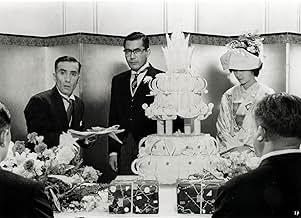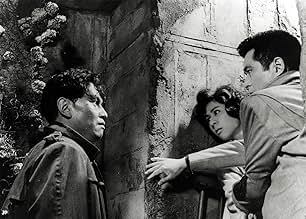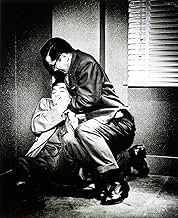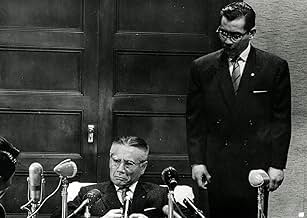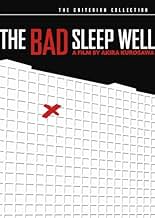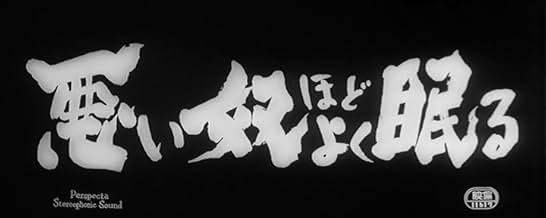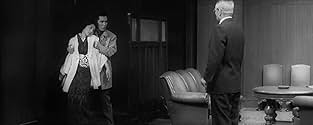Decidido a vengar la muerte de su padre que se ha suicidado ante un escándalo de corrupción empresarial, Nishi enamora a la hija del dueño de la empresa y en el día de la boda se prepara par... Leer todoDecidido a vengar la muerte de su padre que se ha suicidado ante un escándalo de corrupción empresarial, Nishi enamora a la hija del dueño de la empresa y en el día de la boda se prepara para desenmascarar a los culpables.Decidido a vengar la muerte de su padre que se ha suicidado ante un escándalo de corrupción empresarial, Nishi enamora a la hija del dueño de la empresa y en el día de la boda se prepara para desenmascarar a los culpables.
- Dirección
- Guionistas
- Elenco
- Premios
- 3 premios ganados y 1 nominación en total
Opiniones destacadas
This was Kurosawa's most stylised film so far. He takes a nasty, tragic film noir plot-line (and yes, there are elements of Hamlet, but not enough to call it an adaptation) but plays it at some times as if it was a farcical comedy, and at others like it was a horror. The villainous characters appear slightly ridiculous and even cartoonish. Only the most senior amongst them, Iwabuchi, is allowed to keep his dignity. While the others are just puffed-up minions, easily toppled, Iwabuchi seems truly immovable.
The establishing scenes are the film's strongest. It opens, like The Godfather, with a lengthy wedding scene which serves to introduce all the principle characters and set the tone. Everything about the way this scene is put together tells us this is not the happy occasion it should be the hall where the ceremony takes place echoes off-puttingly, a company official about to make a speech cringes as champagne corks go off behind him like gun shots. Add to this an interruption from the police, a gang of journalists and photographers waiting in the wings, and a best man's speech that turns from jokes to threats, and you can practically taste the corruption and decadence that is the focus for this story.
The wedding scene is followed by a montage of newspaper headlines and newsreel footage, reminiscent of similar devices used by Frank Capra and Raoul Walsh. Kurosawa brilliantly choreographs this sequence to music, a rather eerie little dirge more typical of a Japanese period piece than a modern thriller. It's the only example of this kind of montage I know of in Kurosawa's work (it was rare for him to expand the narrative to the bigger picture), but it's a highly effective one-off.
The central plot, of Nishi (Toshiro Mifune) orchestrating spectacular revenge against the men who killed his father, is full of amazing set-pieces. There are echoes of Hitchcock in the way Kurosawa shoves significant objects right up to the camera. The use of music is dazzling, combining upbeat music with unnerving moments to give a great sense of irony. Nishi is the last person the villains suspect, and he often appears innocently in the background with little more significance than an extra, although of course the audience knows better. It's a nice touch that Kurosawa has the character wear glasses, making Mifune almost unrecognisable to us as well.
Sadly, the film's pace slows down after the first hour, and rarely gets back to the same dizzying heights for the rest of its 145 minutes. The lengthy runtime does however allow Kurosawa to add a depth that is absent from your average 100-minute Hollywood Film Noir. Kurosawa could be bleak, but he never forgot the humanity in his films, and this is really the focus in the second half of the film. He takes time to put the spotlight on the innocent victims of revenge (Nishi's wife, Wada's family), and even show the arch-villain in moments of warmth and tenderness with his family. And this is perhaps where the story's biggest similarity with Hamlet is Nishi's revenge falls apart because he is unable to be totally ruthless and unfeeling.
As for the acting, Masayuki Mori is particularly good as Iwabuchi. Just look at his reaction when the second wedding cake pulls up behind him remaining calm, but clearly suppressing concern and annoyance. Kamatari Fujiwara and Akira Nishimura give great over the top performances as Wada and Shirai respectively. Unfortunately this is not one of Toshiro Mifune's great performances. Mifune had an incredible range, but somehow he doesn't quite work as Nishi. In particular, for me he doesn't quite get the emoting right when he begins to realise his feelings for his wife.
Kurosawa always liked to be making some kind of point with all his films, something which sometimes got in the way of decent storytelling. The Bad Sleep Well is a political soapbox picture if ever there was one, but luckily in this case that doesn't water it down quality-wise. True, it is perhaps a little too long, and there are a few dull stretches, but Kurosawa's direction was still at its peak and this stands as one of his best contemporary-set pictures.
The story begins with a masterly curated wedding sequence that aptly introduces all the relevant characters, and paves its foundation by letting the news reporters provide background details about each through their gossips. The revenge plan is already in motion when the film starts, and that scene does well to bring us up to date.
The set pieces are refined, detailed & beautifully lit while the fluid camerawork & crisp greyscale photography provide the imagery its rich intensity & timeless flair. Editing is carried out well for the most part but pacing does slip a little before the third act. All the actors play their roles responsibly, plus it's got Takashi Shimura in a rare villainous role.
Overall, The Bad Sleep Well finds Akira Kurosawa in complete control of his craft, and is yet another quality addition to the legendary auteur's oeuvre. Maintaining its firm grip on audience, the film is tense, captivating & thrilling for the majority of its 151 mins runtime before culminating with an ending that hits close to real-life. In short, an underrated & underseen gem.
¿Sabías que…?
- TriviaThe ideas for the film came from Akira Kurosawa's nephew, Mike Y. Inoue, who wanted to be a scriptwriter and was giving his scripts to his uncle. Kurosawa liked it and made suggestions, to which Inoue spent six months rewriting the script under the title "Bad Men's Prosperity." Kurosawa, along with several others, reworked it even more into the final version, though Inoue did not receive screen credit.
- ErroresWhen Nishi is trying to push Shirai out of the window, the brick wall outside of the window moves around - a lot.
- Citas
Koichi Nishi: It's not easy hating evil. You have to stoke your own fury until you become evil yourself.
- Versiones alternativasOriginally released at 151 in Japan; USA version removes 16 minutes of footage.
- ConexionesFeatured in WatchMojo: Top 10 Movies You Didn't Know Borrowed from Shakespeare (2016)
- Bandas sonorasBridal Chorus
(uncredited)
from "Lohengrin"
Music by Richard Wagner
Played at the end of the wedding ceremony
Selecciones populares
- How long is The Bad Sleep Well?Con tecnología de Alexa
Detalles
Taquilla
- Presupuesto
- JPY 82,540,000 (estimado)
- Total en EE. UU. y Canadá
- USD 46,808
- Fin de semana de estreno en EE. UU. y Canadá
- USD 15,942
- 28 jul 2002
- Total a nivel mundial
- USD 47,023
- Tiempo de ejecución2 horas 31 minutos
- Color
- Relación de aspecto
- 2.35 : 1
Contribuir a esta página



